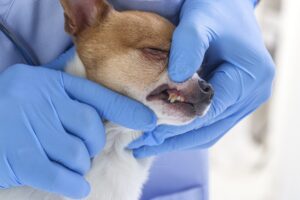
In honor of Pet Dental Month, Mount Carmel Animal Hospital discusses baby teeth in dogs in more detail.
Similar to humans, canines have two sets of teeth in their lifetime. In particular, puppies have 28 deciduous teeth, aka baby teeth, whereas adult dogs have 42 permanent teeth, aka secondary teeth. In honor of Pet Dental Month, Mount Carmel Animal Hospital discusses baby teeth in dogs in more detail.
What are Retained Deciduous Teeth?
Since puppies are born with no teeth, the deciduous teeth begin to erupt through the gums around three weeks of age, and usually, by six weeks of age, all the deciduous teeth are present. When baby teeth in dogs are still present, as the permanent tooth has begun to erupt, it is known as a persistent tooth. When this occurs, the baby tooth occupies the place in the mouth meant for the permanent tooth. This forces the permanent tooth to erupt abnormally alongside the baby tooth.
What Problems Can It Cause?
The end result can lead to teeth crowding and possibly even abnormal contact of the teeth with either soft oral tissue or other teeth. The crowding that occurs from the persistent tooth will increase the chances of food and debris being stuck within the teeth. Food debris and plaque may lead to gingivitis, periodontitis, and tartar deposits. Teeth contacting other teeth wrongfully can lead to teeth weakening and abnormal wear with tooth or teeth fracture. Unfortunately, mispositioned teeth can lead to an abnormal bite.
Commonly Affected Breeds
Even though any deciduous teeth could be persistent, the most prevalent persistent teeth are the upper canines, the lower canines, and the incisors. Persistent teeth are common in small breed canines such as Chihuahuas and Yorkshire Terriers as well as brachycephalic breeds such as Bulldogs, Boston Terriers, and Pugs. Also, there may be a genetic predisposition to developing persistent primary teeth since it often occurs in families of dogs.
Treatment
Generally, no two teeth can be in the same place simultaneously. Typically, baby teeth in dogs must be removed promptly to avoid secondary problems with the erupting permanent counterpart. As this condition is noticeable at a young age, the removal of the persistent teeth is often done at the time of your puppy’s spay or neuter. If you discover a persistent deciduous tooth in your pup’s mouth and plan on waiting to spay or neuter your pet, it is best to schedule an appointment with one of our vets. We can discuss options for removal prior to their spay/neuter procedure to avoid dental issues developing in the meantime.
HERE AT MOUNT CARMEL ANIMAL HOSPITAL, WE’LL TREAT YOUR PETS LIKE FAMILY!
Mount Carmel Animal Hospital has been serving the Northern Baltimore/Southern York community for over 30 years and is proud to be an independently operated, small animal practice committed to excellence in veterinary medicine and client service. From grooming to wellness services, along with Canine Life Skills Training Courses, and surgical procedures, we have the expertise that will best serve the needs of you and your pet. Contact us at 410-343-0200 and follow us on Facebook!
